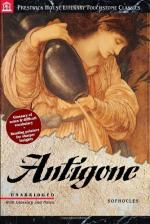|
This section contains 1,037 words (approx. 4 pages at 300 words per page) |

|
Tragic Hero in Antigone
Summary: Because of his social class, general goodness, and tragic flaw, Creon is the tragic hero and is deserving of sympathy after his mistakes take the lives of others.
Aristotle, a Greek philosopher of the fifth century, believed that tragedies most importantly contain a tragic hero, a noble character whose misfortune is brought upon him by an error of judgment and weakness of character, also known as a tragic flaw. As a result of a tragic flaw, the tragic hero may deserve sympathy. In Antigone, by Sophocles, Creon, the king of Thebes, portrays both a judgment error and weakness in character. Because of his social class, general goodness, and tragic flaw, Creon is the tragic hero and is deserving of sympathy after his mistakes take the lives of others.
Creon's high social status, general goodness, tragic flaw, and consequences of his flaw earn him the title of tragic hero in the play. The chorus, a wise group of elders, promotes his social status when they describe Creon as a king "Whom the gods have appointed for us...
|
This section contains 1,037 words (approx. 4 pages at 300 words per page) |

|


